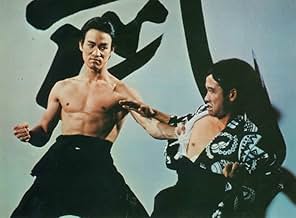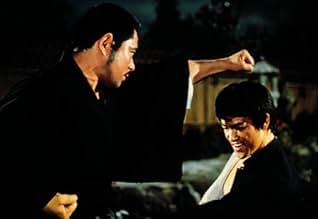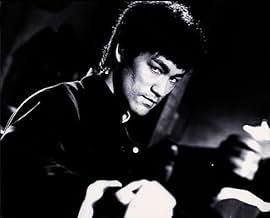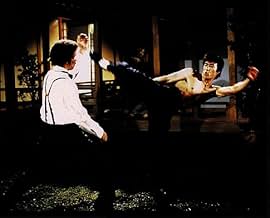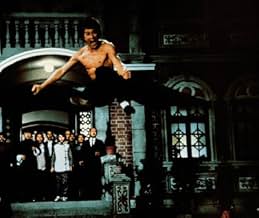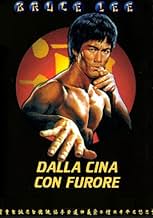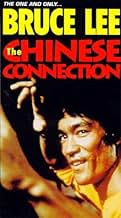IMDb RATING
7.2/10
36K
YOUR RATING
During the Japanese occupation of Shanghai, the star pupil of a recently-deceased martial arts teacher battles a Japanese dojo which seeks the demise of his master's fighting school.During the Japanese occupation of Shanghai, the star pupil of a recently-deceased martial arts teacher battles a Japanese dojo which seeks the demise of his master's fighting school.During the Japanese occupation of Shanghai, the star pupil of a recently-deceased martial arts teacher battles a Japanese dojo which seeks the demise of his master's fighting school.
- Awards
- 2 wins & 1 nomination total
Nora Miao
- Yuan Le-erh
- (as Miao Ker Hsiu)
Chikara Hashimoto
- Hiroshi Suzuki
- (as Riki Hashimoto)
Ying-Chi Li
- Li
- (as Yin Chi Lee)
- Director
- Writer
- All cast & crew
- Production, box office & more at IMDbPro
Featured reviews
This film is a classic but then all of Bruce's completed films are classics. There are strong anti-Japanese messeges (including one Japanese guy having a tash similar to a certain German dictator) in the film but it has been over 33 years since the film was made and so this can be put down to it being dated. Ultimately it is a film about injustice and Revenge. The Bushido School's general evilness, the injustice against the Chinese in Shanghai and Bruce's (called Chen in this one) hot headedness create a circle of violence which escalates completely out of control. This is an intensely gritty Kung Fu film unlike Bruce's later films which were more escapist in nature and Fist Of Fury has the highest body count in terms of Bruce actually killing people with those fists. The legendary 'Sick Man Of Asia' scene is amazing and the end of Kill Bill clearly homage's this so any Tarentino fan's will get an added joy out of watching this beautiful sequence. DO get the uncut version.
The second of the Bruce Lee-starring movies is in terms of plot a lot less interesting than the first. Here, we have the 'student sets out to avenge his master's death' which was already the major storyline of most martial arts films. However, it is handled in a more realistic way then usual and technically it is far superior. Lee was allowed to choreograph his own fights and his battle with Japanese martial artists in their school and climactic duels with a Russian boxer and a Japanese swordsman remains classic fight scenes.
The film drags somewhat in the middle although the lengthy dialogue scene between Lee and his girlfriend was another step forward for the Hong Kong martial arts movie, vivid proof that Lee was a pretty good ACTOR. By contrast, Lee's final farewell to his girlfriend is all the more powerful for being done completely without dialogue at all. The ending is the most powerful and moving of all the Lee films, the final freeze frame managing to encapsulate Lee's grace and power in a single shot.
Many mock Lee's films as being silly and just consisting of fighting. Both accusations are completely untrue. They have far less fights than most films of this kind and, at least in the three Hong Kong films he made, there is a clear message that violence does not solve anything. They may not have the polish of the more recent works of Jackie Chan and Jet Lee but their power remains undiminished, as long as of course one does not watch the awful dubbed versions!
The film drags somewhat in the middle although the lengthy dialogue scene between Lee and his girlfriend was another step forward for the Hong Kong martial arts movie, vivid proof that Lee was a pretty good ACTOR. By contrast, Lee's final farewell to his girlfriend is all the more powerful for being done completely without dialogue at all. The ending is the most powerful and moving of all the Lee films, the final freeze frame managing to encapsulate Lee's grace and power in a single shot.
Many mock Lee's films as being silly and just consisting of fighting. Both accusations are completely untrue. They have far less fights than most films of this kind and, at least in the three Hong Kong films he made, there is a clear message that violence does not solve anything. They may not have the polish of the more recent works of Jackie Chan and Jet Lee but their power remains undiminished, as long as of course one does not watch the awful dubbed versions!
From start to finish, the Chinese Connection (originally released as Fists of Fury) is probably the most entertaining and satisfying of all the Bruce Lee movies. Well paced, with creative and fairly realistic fight scenes distributed evenly, the movie keeps the audience's attention all the way through the long fight scene near the climactic end (I won't spoil the actual ending for you). The predictable revenge plot provides the emotional trigger to release Lee's rage-filled fights and his now-famous smashing of the "No Dogs or Chinese Allowed" sign. Equally famous is his "this time you eat paper, next time you eat glass" line. Viewers are also treated to the only on-screen kiss by Lee, some comical moments with Lee playing a bumbling telephone repairman, a cameo by director Lo-Wei as the chief inspector, and a soundtrack which effectively builds tension in the fight scenes. You won't recognize Jackie Chan as the stuntman for one of the Japanese martial artists who flies through the screen door. The most memorable part of this movie is Lee's dynamic vitality as he goes about his business, cocksure and confident, and with the goods to back it up. I am forever grateful to those who, in marketing this movie to the west, decided to dub only the dialogue and to leave Lee's original fight sounds untouched. As is evident in the US version of Return of the Dragon (aka Way of the Dragon), dubbing Lee's fight sounds is nothing short of a sin.
Written & directed by Wei Lo (who also plays the role of The Inspector), "The Chinese Connection" is simply a classic Bruce Lee martial arts film. It of course serves its purpose of dishing out lots of great combat (complete with hilarious over use of "impact" sounds). But there's more here going on than that. This also features some funny comedy, and some particularly potent drama. It's a tale of bigotry, as the Japanese in Shanghai treat their Chinese counterparts with contempt, and demean them.
Taking place at the turn of the 20th century, it stars Bruce as Chen Zhen, a student who returns to his school to learn that the beloved "Master" has died. Not only that, but he just might have been murdered, to boot. Naturally, Chen swears to solve the crime and get some revenge. He takes on all comers, while the carnage mounts.
There's some pretty delicious gore in this lively affair, which goes on a bit long at one hour and 47 minutes, but it still has much to recommend it. Lo and Bruce get your attention and keep it with their many intense fight sequences. It also offers a little dose of romance, as Chen hopes to marry the girl whom he loves (Nora Miao). The villains are wonderfully despicable; you love to hate them, and eagerly anticipate the inevitable showdown between Bruce and characters such as Petrov (Robert Baker), a massive Russian who shows off his superhuman strength in one amusing segment.
The acting is just fine from everybody concerned. Bruce is indeed at his best, proving his physical prowess at every turn and displaying that memorable screen presence.
Good, solid action entertainment, a must for martial arts fans.
Eight out of 10.
Taking place at the turn of the 20th century, it stars Bruce as Chen Zhen, a student who returns to his school to learn that the beloved "Master" has died. Not only that, but he just might have been murdered, to boot. Naturally, Chen swears to solve the crime and get some revenge. He takes on all comers, while the carnage mounts.
There's some pretty delicious gore in this lively affair, which goes on a bit long at one hour and 47 minutes, but it still has much to recommend it. Lo and Bruce get your attention and keep it with their many intense fight sequences. It also offers a little dose of romance, as Chen hopes to marry the girl whom he loves (Nora Miao). The villains are wonderfully despicable; you love to hate them, and eagerly anticipate the inevitable showdown between Bruce and characters such as Petrov (Robert Baker), a massive Russian who shows off his superhuman strength in one amusing segment.
The acting is just fine from everybody concerned. Bruce is indeed at his best, proving his physical prowess at every turn and displaying that memorable screen presence.
Good, solid action entertainment, a must for martial arts fans.
Eight out of 10.
Undoubtedly Lee's most intense performance, Wei's powerful kung fu classic is ripe with anti-Japanese hysteria and propaganda, so much so that there's not a single pleasant Jap' in the movie (unlike the up-to-date modern re-make). That aside, essentially this is a riotous Bruce Lee vehicle, kicking out trademarks and smashing up all evil in the process. The plot (Lee's sifu poisoned by Japanese school in turn-of-the-century Shanghai) is a valid excuse to string a great line-up of fight sequences together, and what great action this is: Bruce pounds the lights out of a dojo full of evil Japs using only fists, feet and nunchakus, and the duel with Baker (Lee's real-life personal bodyguard) near the movie's end is sheer entertainment typified. Though based on factual events, the subject matter is vastly exaggerated. Nevertheless, as kung fu theatre goes, Fist of Fury is an immensely satisfying experience, and stands as probably Lee's best Hong Kong work.
Did you know
- TriviaJackie Chan doubled for Chikara Hashimoto for the scene where Chen kicks him out of the window. He took the kick and flew several feet. Bruce Lee immediately checked to see if he was okay. Chan played a guard Lee kills in Opération Dragon (1973).
- GoofsWhen Bruce is spinning the two Bushido students in the Bushido school, they are clearly two lightweight dummies.
- Alternate versionsFor its original 1972 UK cinema release the BBFC requested a cut to remove a shot of a flying throat kick, though it appeared intact in all early theatrical prints and was possibly waived before release. In 1978 the film was withdrawn by BBFC director James Ferman (together with Opération Dragon (1973)) and all nunchaku footage removed together with the previously mentioned throat kick, and these cuts, (totalling 2 mins 51 secs) would persist in all of the film's UK video releases. The cuts were fully restored for the 2001 Hong Kong Legends release.
- ConnectionsEdited into Le Jeu de la mort (1978)
- SoundtracksAtmospheres
Written by György Ligeti
Performed by Das Orchester des Südwestfunks Baden-Baden
Courtesy of MGM Records
Brief excerpt, played twice, during dramatic death scenes
Details
Box office
- Budget
- $100,000 (estimated)
Contribute to this page
Suggest an edit or add missing content





